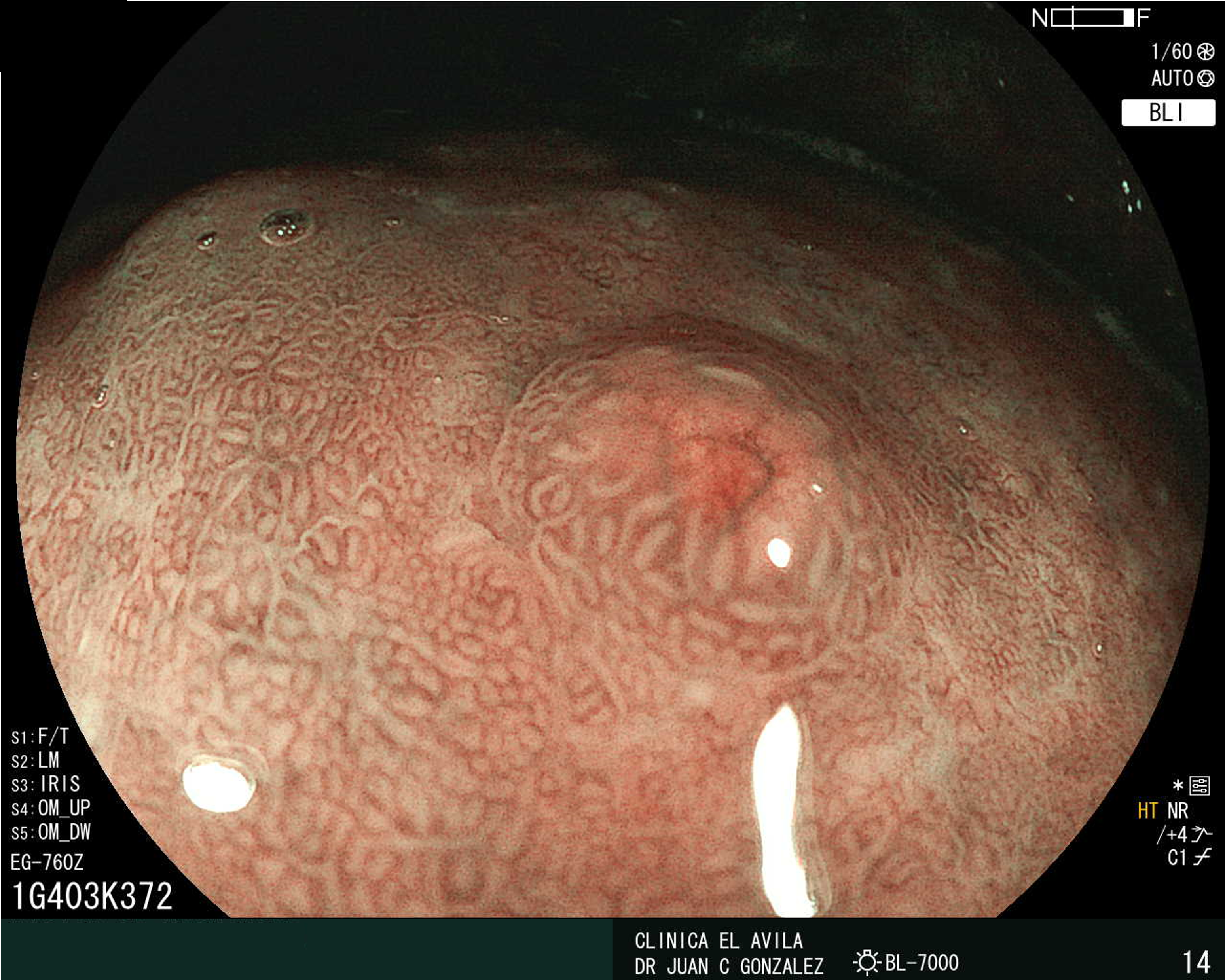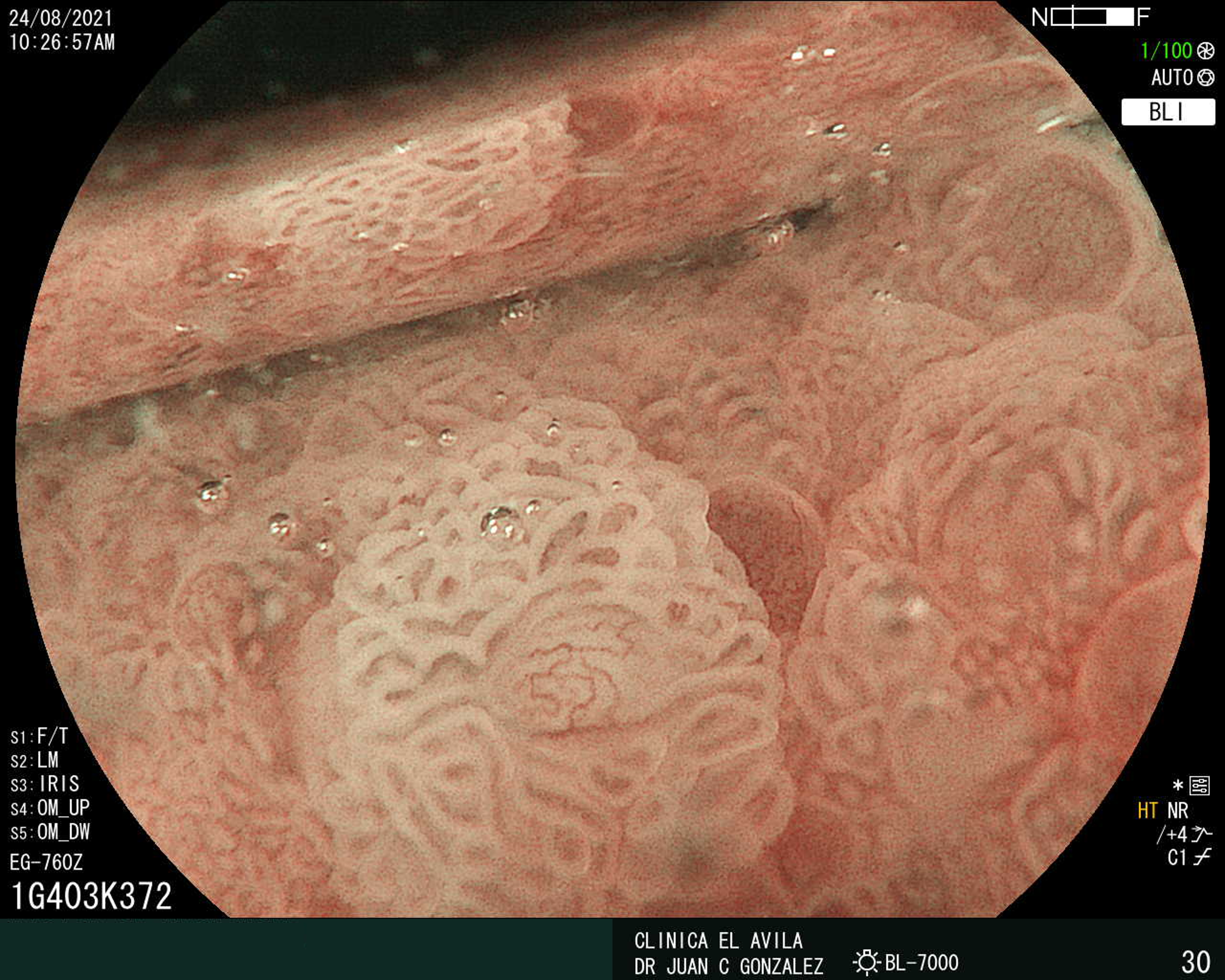Adenocarcinoma bien diferenciado de intestino delgado: una entidad infrecuente
Resumen
El adenocarcinoma de intestino delgado es una neoplasia rara que representa menos del 2% de todas las neoplasias gastrointestinales. Su diagnóstico es frecuentemente tardío debido a su presentación clínica inespecífica, lo que se traduce en un pronóstico desfavorable. Se ha asociado a condiciones predisponentes como la enfermedad de Crohn, aunque su fisiopatología aún no se comprende completamente. Presentamos el caso de una paciente femenina con dolor abdominal crónico y pérdida de peso significativa, en quien se detectó un adenocarcinoma de intestino delgado tras múltiples estudios diagnósticos. El manejo incluyó resección quirúrgica, con hallazgos patológicos que confirmaron la naturaleza maligna del tumor. Este caso subraya la importancia de considerar esta entidad en el diagnóstico diferencial de patologías abdominales crónicas para lograr un diagnóstico precoz y mejorar el pronóstico del paciente.
ESCUCHE EL RESUMEN HANCIENDO CLIC EN EL IDIOMA DE SU PREFERENCIA:
EspañolEnglish
Portugues
Japones
Palabras clave
Texto completo:
PDFReferencias
Overman MJ. Epidemiology and clinical features of small bowel neoplasms. UpToDate. 2024. Disponible en: https://www.uptodate.com/contents/epidemiology-and-clinical-features-of-small-bowel
Neugut AI, Jacobson JS, Suh S, Mukherjee R, Arber N. The epidemiology of cancer of the small bowel. Cancer Epidemiol Biomarkers Prev. 1998;7:243–51.
Overman MJ. Diagnosis and staging of small bowel neoplasms. UpToDate. 2024. Disponible en: https://www.uptodate.com/contents/epidemiology-and-clinical-features-of-small-bowel
Howe JR, Karnell LH, Menck HR, Scott-Conner C. Adenocarcinoma of the small bowel: review of the National Cancer Data Base, 1985–1995. Cancer. 1999;86(12):2693–706.
Aparicio T, Zaanan A, Svrcek M, Laurent-Puig P, Carrère N, Manfredi S, et al. Small bowel adenocarcinoma: epidemiology, risk factors, diagnosis and treatment. Dig Liver Dis. 2014;46(2):97–104.
Bilimoria KY, Bentrem DJ, Wayne JD, Ko CY, Bennette CL, Talamonti MS. Small bowel cancer in the United States: changes in epidemiology, treatment, and survival over the last 20 years. Ann Surg. 2009;249(1):63–71.
Negoi I, Paun S, Hostiuc S, Negoi RI, Beuran M. Most small bowel cancers are revealed by a complication. Chirurgia (Bucur). 2017;112(1):12–21.
Overman MJ. Recent advances in the management of adenocarcinoma of the small intestine. Gastrointest Cancer Res. 2009;3(3):90–6.
Halfdanarson TR, McWilliams RR, Donohue JH, Quevedo JF. A single-institution experience with 491 cases of small bowel adenocarcinoma. Am J Surg. 2010;199(6):797–803.
Dabaja BS, Suki D, Pro B, Bonnen M, Ajani J. Adenocarcinoma of the small bowel: presentation, prognostic factors, and outcome of 217 patients. Cancer. 2004;101(3):518–26.
Howe JR, Karnell LH, Scott-Conner C. Surgical treatment of small bowel adenocarcinoma. Cancer. 1999;86(3):363–73.
Khosla D, Dey T, Madan R, Gupta R, Goyal S, Kumar N, et al. Small bowel adenocarcinoma: an overview. World J Gastrointest Oncol. 2022;14(2):413–22. doi: 10.4251/wjgo.v14.i2.413.
Aparicio T, Zaanan A, Svrcek M, Laurent-Puig P, Carrère N, Manfredi S, et al. Small bowel adenocarcinoma: epidemiology, risk factors, diagnosis and treatment. Dig Liver Dis. 2014;46(2):97–104.
Fujimori S, Hamakubo R, Hoshimoto A, Nishimoto T, Omori J, Akimoto N, et al. Risk factors for small intestinal adenocarcinomas that are common in the proximal small intestine. World J Gastroenterol. 2022;28(39):5658–65. doi: 10.3748/wjg.v28.i39.5658.
Severson RK, Schenk M, Gurney JG, Weiss LK, Demers RY. Increasing incidence of adenocarcinomas and carcinoid tumors of the small intestine in adults. Cancer Epidemiol Biomarkers Prev. 1996;5:81–4.
Carrère N, Samalin E, Cellier C, Aparicio T, Becouarn Y, Bedenne L, et al. Adenocarcinoma de intestino delgado: guías de práctica clínica intergrupal francesas para diagnóstico, tratamientos y seguimiento (SNFGE, FFCD, GERCOR, UNICANCER, SFCD, SFED, SFRO). Dig Liver Dis. 2018;50:15–9.
Cloyd JM, George E, Visser BC. Adenocarcinoma duodenal: avances en el diagnóstico y el tratamiento quirúrgico. World J Gastrointest Surg. 2016;8:212–21.
Khan K, Peckitt C, Sclafani F, Watkins D, Rao S, Starling N, et al. Prognostic factors and treatment outcomes in patients with small bowel adenocarcinoma (SBA): the Royal Marsden Hospital (RMH) experience. BMC Cancer. 2015;15:15.
Sohn TA, Lillemoe KD, Cameron JL, et al. Adenocarcinoma of the duodenum: factors influencing long-term survival. J Gastrointest Surg. 1998;2:79–87.
Young JI, Mongoue-Tchokote S, Wieghard N, et al. Tratamiento y supervivencia del adenocarcinoma de intestino delgado en los Estados Unidos: una comparación con el cáncer de colon. Dis Colon Rectum. 2016;59:306–12.
Schrock AB, Devoe CE, McWilliams R, et al. Genomic profiling of small-bowel adenocarcinoma. JAMA Oncol. 2017;3:1546–53.
Adam L, San Lucas FA, Fowler R, et al. DNA sequencing of small bowel adenocarcinomas identifies targetable recurrent mutations in the ERBB2 signaling pathway. Clin Cancer Res. 2019;25:641–51.
Cabel L, Aparicio T, Bieche I, et al. ERBB3-activating mutations in small bowel adenocarcinomas. JCO Precis Oncol. 2018;2.
Gulhati P, Raghav K, Shroff RT, et al. Bevacizumab combined with capecitabine and oxaliplatin in patients with advanced adenocarcinoma of the small bowel or ampulla of Vater: a single-center, open-label, phase 2 study. Cancer. 2017;123:1011–8.
DOI: http://dx.doi.org/10.61155/gen.v79i3.754
IMÁGENES GEN
| Figura 1. Tumor Neuroendocrino Gástrico | Figura 2. Hiperplasia de Células Neuroendocrinas en estómago |
 |  |
 |  |  |
ISSN: 0016-3503 e-ISSN: 2477-975X










